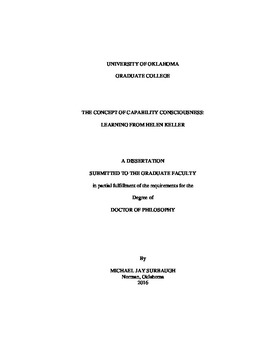| dc.description.abstract | This dissertation is a philosophical analysis of the meaning of a concept I name “capability consciousness” and propose as useful for special education. Understanding this concept can help us answer an educationally and existentially significant question, “How can a person with a profound disability come to know herself capable?” Through a case study approach, I theorize the meaning, value, and significance of capability consciousness evident in autobiographical narratives by Helen Keller, primarily from The Story of My Life (Keller 2003) and The World I Live In (1914). My study of Keller’s texts draws a strong distinction between capability consciousness and “disabled consciousness,” and also explores a range of sub-concepts such as “capability disposition,” “capability defense,” “capability propensity,” “disabled disposition,” “disabled defense” and “disabled propensity.” My analysis builds critically on concepts such as “consciousness” (Arendt 1978, Rockwell 2005, Johnson 2007) “capability,” “habit,” (Dewey 2002, Kestenbaum 1977) and “capabilities approach” (Nussbaum 2011, Nussbaum 2007, Terzi 2008, 2005) using resources drawn from philosophy (Arendt 1978, Dewey 1984, 2002, 2005) and the empirical/cognitive sciences (Damasio 1999, Stern 2000, Stern 2002, Gibbs 2006, Siegel 2012).
My analysis, which is grounded in selections of Keller’s narratives, poses three questions: (1) how did Helen Keller come to know herself capable despite profound disability (2) how did Keller view education as supportive of her positive assessment of her capability; (3) what philosophical and empirical science scholarship exists to support Helen Keller’s disposition of capability consciousness (Siegel 2012, Stern 2000, Stern 2002, Vanlierde et al. 2003, Röder and Rösler 2004, Rödera and Wallace 2010, Merabet and Pascual-Leone 2010, Cattaneo et al. 2008, Cattaneo and Vecchi 2008, 2011). This inquiry suggests that capability consciousness involves engendering and encouraging an embodied experiential sense (Shusterman 1992; 2007) of capability through an environment favorable to the child’s ways of learning (Dewey 1998, 2004). By focusing attention on the child’s capabilities and ways of learning as the substrate for instruction, the teacher may encourage a student’s sense of ontological parity (Buchler YEAR) about self towards others, despite differences that are labeled disabling (Surbaugh 2011, Wallace 1999, Buchler et al. 1990, Stiker 1999b).
The significance of this inquiry lies in proposing a foundation for meeting individualized educational needs in ways that challenge beliefs and attitudes that in fact are disabling to students with disability (Wendell 1996, Stiker 1999). In my conclusion, I propose the concept of capability consciousness as an educational aim that should accompany any curriculum implementation. | en_US |
